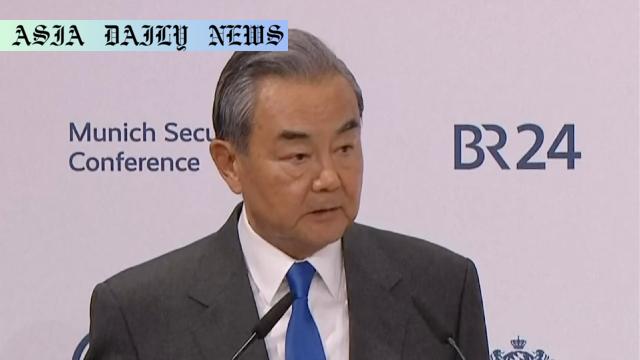Tariffs: Beijing’s call for dialogue despite trade tensions.
- China’s Foreign Minister Wang Yi emphasizes dialogue over US-China tariff tensions.
- Beijing prepared to counter US’s additional 10% tariff hikes.
- Observers speculate Wang’s speech aims to avoid further trade conflict.
- Wang Yi champions mutual respect and win-win cooperation in US-China relations.

Introduction to the Tariff Dispute
The ongoing trade tensions between the United States and China have once again claimed the spotlight in global economic discussions. The recent tariffs escalation by Washington, followed swiftly by retaliatory measures from Beijing, has brought uncertainty to international trade. Chinese Foreign Minister Wang Yi addressed the issue during his speech at the Munich Security Conference, emphasizing the importance of dialogue in resolving these disputes. While trade wars often lead to detrimental outcomes for both parties, China remains steadfast in pursuing strategies that align with mutual respect and cooperation.
Understanding the US Tariff Hikes
Earlier this month, the United States implemented an additional 10% increase in tariffs on Chinese imports, a move seen as a strategy to pressure Beijing over trade and intellectual property concerns. The tariffs primarily target Chinese goods across a range of industries, exacerbating an already strained bilateral relationship. Beijing, while criticizing these protectionist measures, has responded in kind by raising its tariffs on selected American goods. These developments highlight the complexities of economic interdependence and the potential for further escalation in the absence of constructive dialogue.
China’s Strategic Response
Foreign Minister Wang Yi’s remarks offer valuable insights into Beijing’s approach toward the escalating tensions. Beyond the immediate response of imposing counter-tariffs, Wang stressed the need for mutual respect and peaceful coexistence. His speech underscored China’s commitment to win-win cooperation, suggesting that Beijing is willing to negotiate rather than retaliate endlessly. However, it is clear that China is equally determined not to back down without safeguarding its interests, making it adept at leveraging diplomatic avenues while asserting its economic stance.
The Broader Implications
Observers suggest that Wang Yi’s speech may partly be aimed at encouraging Washington to reconsider its tariff policies and avoid a full-scale trade war. Such conflicts, historically, have proven to disrupt global supply chains and create economic instability, not only for the involved nations but also on a global scale. The Chinese government’s emphasis on cooperation and dialogue strikes a stark contrast with the more aggressive tariff strategies pursued by the United States. Moreover, it reflects a broader narrative of globalization versus protectionism, a debate that has persisted prominently in contemporary world economics.
Looking Ahead
While the tension between the world’s two largest economies continues to simmer, the path forward remains uncertain. For stakeholders in both nations, the outcomes are critical, from the smallest manufacturer to the most influential corporation. Diplomatic efforts such as Wang Yi’s call for dialogue are instrumental in offering hope for a resolution. However, whether these calls translate into tangible actions from Washington remains to be seen. Ultimately, a balanced resolution is essential not just for China and the United States but for maintaining stability in the broader international economic order.
Conclusion
In conclusion, Wang Yi’s speech at the Munich Security Conference serves as a pivotal moment in the ongoing US-China trade conflict. His emphasis on dialogue and cooperation underscores a starkly different approach from the retaliatory actions frequently witnessed in trade disputes. The broader implications of these tensions highlight the need for pragmatic decision-making on both sides. As the world watches closely, the hope remains that both nations can reach a consensus that benefits all stakeholders involved in the global economy.



Commentary
The Complexity of US-China Trade Relations
The ongoing tariff war between the United States and China reflects one of the most critical economic challenges of our time. Both nations wield tremendous influence on the global stage, and their disputes over trade policies have repercussions far beyond their borders. While Washington’s decision to hike tariffs may stem from concerns over trade imbalances and intellectual property rights, its approach risks alienating a vital trade partner. Beijing’s willingness to engage in dialogue, as emphasized by Wang Yi, provides a much-needed avenue for diplomacy amidst mounting tension. This approach not only demonstrates China’s focus on global cooperation but also potentially positions it as the more measured actor in this conflict.
The Role of Mutual Respect in Conflict Resolution
What stands out from Wang Yi’s speech is his insistence on mutual respect as a cornerstone of China’s foreign policy. This principle, though simple, holds profound implications for trade negotiations. In an era where protectionism has seen resurgence, promoting cooperative solutions is vital. The Chinese government’s commitment to balancing firm countermeasures with open lines of negotiation sets a notable precedent for handling such conflicts. However, the efficacy of this strategy depends significantly on Washington’s willingness to reciprocate in kind, a prospect that remains uncertain given the current US administration’s track record on trade issues.
Conclusion: A Need for Constructive Engagement
As the global community watches the US-China tariff dispute unfold, it is evident that there is no easy resolution in sight. Both sides must prioritize constructive dialogue over measures that merely escalate tensions. More importantly, they must recognize their shared responsibility in maintaining global economic stability. Wang Yi’s emphasis on cooperation sends a hopeful message, but it remains to be seen if Washington will take meaningful steps toward de-escalation. At this juncture, the world can only hope that sound diplomacy will prevail over confrontation, ensuring a balanced and prosperous future for all.